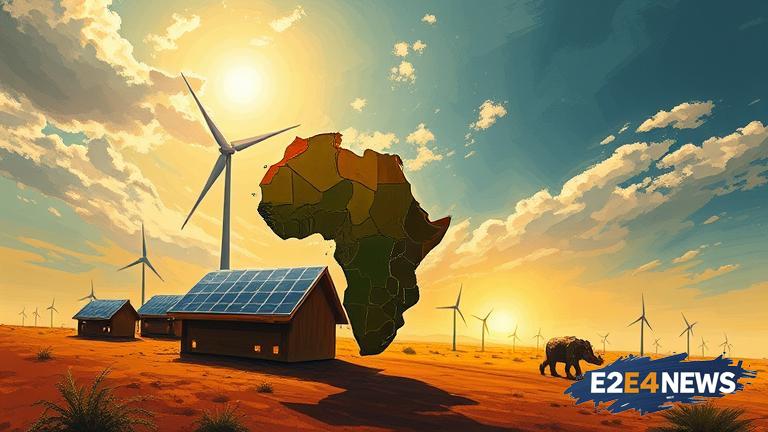The African continent is witnessing a significant shift towards renewable energy, driven by the need to address the pressing issues of energy access, climate change, and sustainable development. With many countries still struggling to provide reliable and affordable electricity to their citizens, renewable energy has emerged as a viable solution. Solar and wind power, in particular, have become increasingly popular due to their abundance and decreasing costs. Governments and private investors are investing heavily in renewable energy projects, ranging from small-scale solar home systems to large-scale wind farms and solar parks. This trend is expected to continue, with the International Energy Agency (IEA) predicting that Africa will become a major hub for renewable energy production in the coming decades. The benefits of renewable energy are numerous, including reduced greenhouse gas emissions, improved air quality, and enhanced energy security. Moreover, renewable energy can create jobs, stimulate local economies, and contribute to poverty reduction. Several African countries have set ambitious renewable energy targets, with some aiming to generate up to 100% of their electricity from renewable sources by 2030. South Africa, for example, has launched a series of renewable energy auctions, which have attracted significant investment and led to the development of several large-scale solar and wind farms. Similarly, Morocco has made significant strides in renewable energy, with a focus on solar power and a goal of generating 52% of its electricity from renewable sources by 2030. Other countries, such as Egypt, Kenya, and Ghana, are also making progress in the renewable energy sector. The African Union has launched several initiatives to support the development of renewable energy, including the Africa Renewable Energy Initiative, which aims to achieve at least 300 GW of renewable energy capacity by 2030. The private sector is also playing a crucial role in promoting renewable energy in Africa, with companies such as Vestas, Siemens Gamesa, and Enel Green Power investing in renewable energy projects across the continent. However, despite the progress made, there are still significant challenges to be addressed, including the need for improved energy storage, grid infrastructure, and policy frameworks. Additionally, the high upfront costs of renewable energy technologies can be a barrier to adoption, particularly for smaller-scale projects. To overcome these challenges, governments, private investors, and international organizations must work together to create an enabling environment for renewable energy development. This can involve providing financing options, technical assistance, and capacity-building programs to support the growth of the renewable energy sector. Furthermore, there is a need for greater awareness and education about the benefits of renewable energy, as well as the importance of energy efficiency and conservation. By working together, Africa can unlock its vast renewable energy potential, reduce its dependence on fossil fuels, and create a more sustainable and prosperous future for its citizens. The continent’s renewable energy revolution has the potential to drive economic growth, improve energy access, and mitigate climate change, making it an exciting and critical area of development. As the world transitions towards a low-carbon economy, Africa is well-positioned to play a leading role in the global renewable energy market. With its abundant natural resources, growing economies, and increasing demand for energy, the continent is poised to become a major player in the renewable energy sector. In conclusion, Africa’s renewable energy revolution is gaining momentum, driven by the need for sustainable development, energy access, and climate change mitigation. While there are challenges to be addressed, the benefits of renewable energy are clear, and the continent is well-positioned to unlock its vast renewable energy potential and create a more sustainable future for its citizens.
